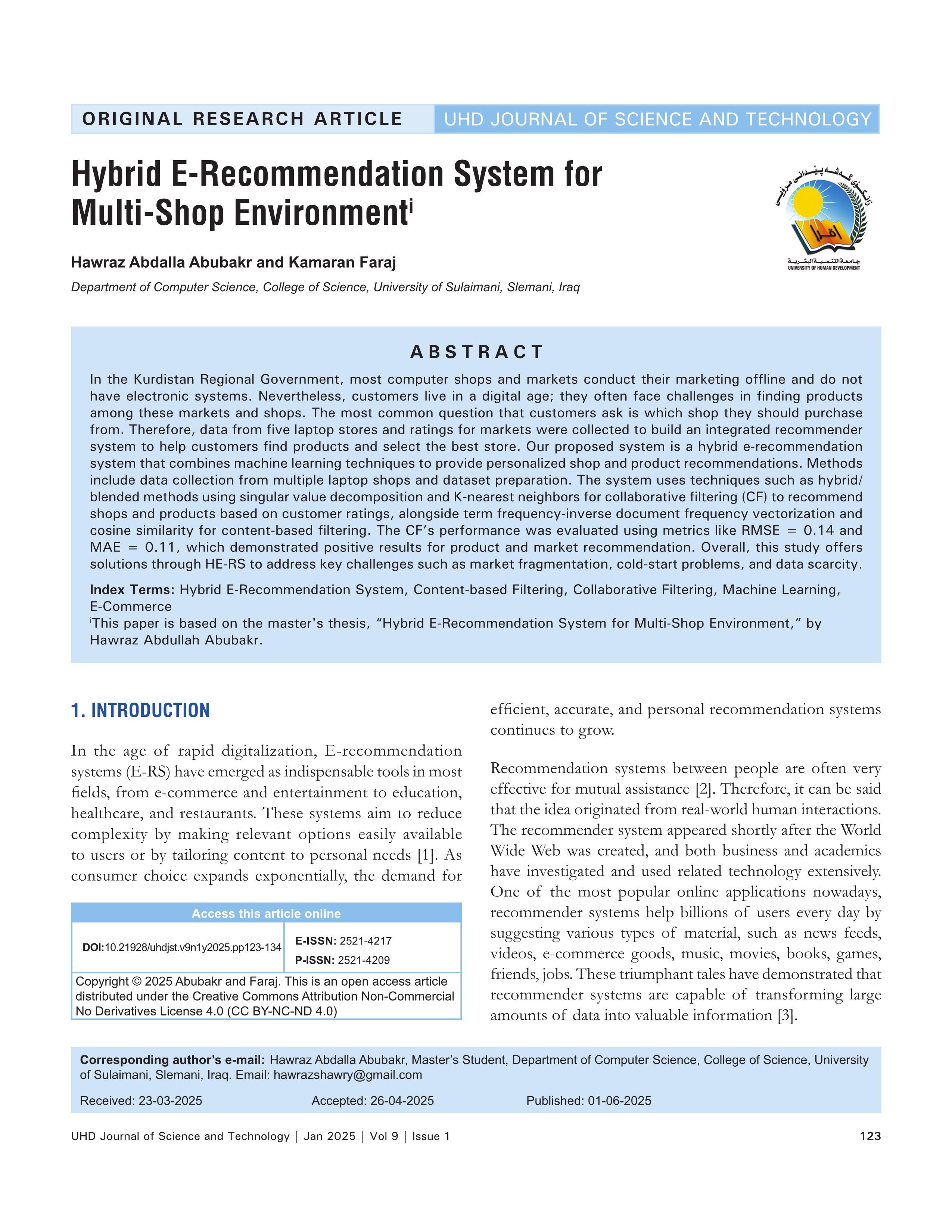Hybrid E-Recommendation System for Multi-Shop Environment
DOI:
https://doi.org/10.21928/uhdjst.v9n1y2025.pp123-134Keywords:
Hybrid E-Recommendation System (HE-RS), Content-Based Filtering (CBF), Collaborative Filtering (CF), Machine Learning (ML), E-commerceAbstract
In the Kurdistan Regional Government, most computer shops and markets conduct their marketing offline and do not have electronic systems. Nevertheless, customers live in a digital age; they often face challenges in finding products among these markets and shops. The most common question that customers ask is which shop they should purchase from. Therefore, data from five laptop stores and ratings for markets were collected to build an integrated recommender system to help customers find products and select the best store. Our proposed system is a hybrid e-recommendation system that combines machine learning techniques to provide personalized shop and product recommendations. Methods include data collection from multiple laptop shops and dataset preparation. The system uses techniques such as hybrid/blended methods using singular value decomposition and K-nearest neighbors for collaborative filtering (CF) to recommend shops and products based on customer ratings, alongside term frequency-inverse document frequency vectorization and cosine similarity for content-based filtering. The CF’s performance was evaluated using metrics like RMSE = 0.14 and MAE = 0.11, which demonstrated positive results for product and market recommendation. Overall, this study offers solutions through HE-RS to address key challenges such as market fragmentation, cold-start problems, and data scarcity.
References
F. Ricci, L. Rokach and B. Shapira. Recommender Systems: Techniques, Applications, and Challenges. In: “Recommender Systems Handbook”. Springer Science and Business Media, Germany, pp. 1-35, 2021.
S. Moica, C. Veres Harea and L. Marian. “Effects of Suggestion System on Continuous Improvement: A Case Study”. IEEE, United States, pp. 592-596, 2018.
Z. Dong, Z. Wang, J. Xu, R. Tang and J. Wen. “A Brief History of Recommender Systems”. [arXiv Preprint], 2022.
K. Bodduluri, F. Palma, A. Kurti, I. Jusufi and H. Löwenadler. “Exploring the landscape of hybrid recommendation systems in E-commerce: A systematic literature review”. IEEE Access, vol. 12, pp. 28273-28296, 2024.
F. Ricci, L. Rokach and B. Shapira, editors. Recommender Systems: Techniques, Applications, and Challenges. In: “Recommender Systems Handbook”. New York, Springer US, pp. 1-35, 2022.
M. R. Hasan and J. Ferdous. “Dominance of AI and machine learning techniques in hybrid movie recommendation system applying text-to-number conversion and cosine similarity approaches”. Journal of Computer Science and Technology Studies, vol. 6, no. 1, pp. 94- 102, 2024.
M. Mouhiha, O. A. Oualhaj and A. Mabrouk. “Combining Collaborative Filtering and Content Based Filtering for Recommendation Systems”. IEEE, United States, pp. 1-6, 2024.
M. Loukili, F. Messaoudi and M. El Ghazi. “Machine learning based recommender system for e-commerce”. IAES International Journal of Artificial Intelligence, vol. 12, no. 4, pp. 1803-1811, 2023.
N. Cherkaoui, K. El Handri, M. D. Y. Tanoga, Y. El Hassani and A. Errafyg. “Consumer behaviour: Analysing marketing campaigns through recommender systems and statistical techniques”. Marketing and Management of Innovations, vol. 15, no. 3, pp. 1-12, 2024.
S. Ozturk, A. B. Ercan, R. Tugay and Ş. G. Öğüdücü. Enhancing Cross-Market Recommendation System with Graph Isomorphism Networks: A Novel Approach to Personalized User Experience. In: “Proceedings of the 2024 9th International Conference on Machine Learning Technologies”, 2024.
D. Patel, F. Patel and U. Chauhan. “Recommendation systems: Types, applications, and challenges”. International Journal of Computing and Digital Systems, vol. 13, pp. 2210-2142, 2023.
J. B. Schafer, D. Frankowski, J. Herlocker and S. Sen. Collaborative filtering recommender systems. In: P. Brusilovsky, A. Kobsa and W. Nejdl, editors. “The Adaptive Web: Methods and Strategies of Web Personalization”. Springer, Berlin, Heidelberg, pp. 291-324, 2007.
T. M. Mitchell. “Machine Learning”. Vol. 1. McGraw-Hill, New York, 1997. Available from: https://www.pachecoj.com/courses/csc380_ fall21/lectures/mlintro.pdf [Last accessed on 2025 Apr 19].
F. Weiner, P. L. Teh, and C. B. Cheng. “Systematic Review of Machine Learning in Recommendation Systems Over the Last Decade”. Springer Nature Switzerland, Cham, 2024.
M. Chiny, M. Chihab, O. Bencharef and C. Younes. “Netflix Recommendation System Based on TF-IDF and Cosine Similarity Algorithms”. no. BML, pp. 15-20, 2022. Available from: https:// www.scitepress.org/Link.aspx?doi=10.5220/0010727500003101 [Last accessed on 2025 Apr 19].
B. Sarwar, G. Karypis, J. A. Konstan and J. T. Riedl. Application of dimensionality reduction in recommender system-a case study. In: “ACM WebKDD 2000 Web Mining for E-Commerce Workshop”. Boston, MA, USA, 2000.
O. Kramer. K-Nearest Neighbors. In: “Dimensionality Reduction with Unsupervised Nearest Neighbors”. Springer, Berlin, Heidelberg, 2013, pp. 13-23.

Downloads
Published
How to Cite
Issue
Section
License
Copyright (c) 2025 Hawraz Abdalla Abubakr, Kamaran Faraj

This work is licensed under a Creative Commons Attribution-NonCommercial-NoDerivatives 4.0 International License.


